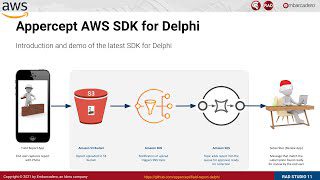
Desktop applications were the primary approach to building software systems. They were all desktop applications, whether they developed utility, a small tool, or a complex architected app. Then Internet technologies started to shape the development world. Like you create an app, and everyone gets the updates automatically. But the Internet architecture infrastructure, underlying protocols, and standards like HTTP and HTML weren’t prepared for building complex systems.
Despite the statistics about web and mobile applications, desktop applications rule the game for specific tasks by giving high productivity and high-speed performance that you cannot get from web and mobile apps. This explains why millions of developers build their projects with Delphi, C++, and C#. For many, their first choice is to carry out that development on Windows.
Table of Contents
What are the reasons for developing desktop applications?
These are some of the reasons for choosing desktop applications in your development:
- Performance is much higher
- More efficient multithreading apps
- Easy access hardware devices
- Many experts and a knowledge base are available to develop Windows desktop applications.
- Less complexity and easy to get started with
Since desktop development is an enormous area, we have thousands of different tools to create applications. As expected, not all the tools are efficient, easy to use, and support the latest Windows features. This article will discuss achieving better results with better Windows software development tools.
Complex UI Designing is much easier with the right tools
Microsoft provides all the tools to create any application with its development libraries and frameworks. WPF, UWP for Windows desktop development, and MAUI for cross-platform app development. But to design user interfaces, you should use XAML while other tools like RAD Studio’s Delphi provides a high-speed UI development environment. You can drag and drop visual and non-visual components to the form, and you are ready to go.

Moreover, the FireMonkey cross-platform app development framework allows you to put a UI control into another UI element, giving a great experience if you need an advanced user interface. Furthermore, you can transform your whole UI/UX to another level by just applying styles.

To point out, Delphi’s award-winning Visual Component Library (VCL) for Windows is the most stable framework in the Windows desktop development industry. Why? Because it has been around for more than 27 years and in active development and apps built with Delphi 20 years ago works appropriately without any dependency on modern Windows OS and devices.
Delphi’s FireMonkey (FMX) visual framework for cross-platform responsive UIs. FireMonkey is one of the advanced cross-platform development frameworks you can use to create Android, iOS, macOS, Linux, Windows, and Web applications from a single code base.

Choosing the wrong tool leads to low or impaired productivity
Building graphical applications with Delphi is 5X faster than any GUI development tool in the market. You can design beautiful Desktop and Mobile application UIs with Delphi in seconds. Use the visual design menu to drag easily and drop visible and non-visual components from the palette.
Prototype faster with visual lines and enhanced margin and padding support. Use VCL Styles at design time! Prototype stylish UIs even more quickly by seeing immediately at design-time how your styled forms and controls will look when running.
Better code readability directly correlates with better productivity
Developers who used Delphi and its VCL or FMX frameworks know that building cross-platform and responsive UI is easy, and there won’t be much code around UI & UX. For instance, if you utilize Microsoft’s UI development frameworks, you should use XAML to build complex user interfaces. While this might sound all right to you, if you try and make apps with Delphi’s VCL and FireMonkey, you understand why we emphasize the app development experience with Delphi!
Moreover, Delphi’s syntax is one of the easiest syntaxes available. While others carefully put their indentations and match brackets, writing code in Delphi is like writing a poem in the English language.
Choosing the wrong tool can mean your apps can’t support the latest Windows features
This directly leads to usability atrophy and contributes to your user’s perception that your app is outdated or obsolete.
Delphi’s Visual Component Library architecture is so well established that you can get pure device performance along with the latest features of the Windows operating system dev tools.
RAD Studio IDE supports all the needed tools to create your next modern Windows 11 application. For instance, Windows 11 ships with the WebView2 controls, and Delphi’s VCL has TEdgeBrowser and support for smooth MSIX deployment. Moreover, the latest Windows 11 VCL Styles are available in the GetIt Package Manager.

The most visible visual element of Windows 11 is rounded UI controls, like corners. Follow this tutorial to learn how to control Windows 11 rounded corners in your app written by Ian Barker (MVP).

All the changes by Microsoft indicate that native Windows development remains a vital and mainstream option to develop apps for the Windows ecosystem. The Visual Component Library maps to classic and modern APIs (WinAPI, COM, and WinRT APIs) and supports current trends.

New Native UI Framework – WinUI 3
Windows App SDK includes a new native UI framework called WinUI 3. It is the current framework in the Windows Runtime architecture, and you can easily use WinUI 3 controls in your Delphi applications. Check out this tutorial to learn how to utilize WinUI 3 in your Delphi app.
Are you letting a slow compiler eat away your development time?
You can see all the different Windows desktop development IDEs that promise high productivity and fast build/compile time but not all provide it. Delphi’s compiler is one of the best and fastest compilers in the market. If you need proof, check out this brief demonstration:
Besides this powerful and fast compiler, there are ways to improve and create swift applications. Be sure to check out this tutorial to learn how to utilize RAD Studio IDE and its debugging features intelligently.
Is the toolchain you’re using unnecessarily complex or is it a single click like RAD Studio?
A software toolchain is a collection of software development tools used to complete complex software development tasks or deliver a software product. You can optimize the software development process by chaining a set of development tools.
RAD Studio IDE is the most valuable platform for developing any application because it has collections of tools and automation features inside. For instance, if you are developing applications for Windows, everything is there for you from the beginning to deploy to the Microsoft Store. It would be best if you utilized available functions inside the IDE.

Or, if you are going to create a cross-platform application deployed to Linux, macOS, iOS, Android, and Windows, everything is ready to assist you inside the IDE. It does not create cumbersome processes.
Steps in Creating Multi-Device Applications
Are you missing vital runtime packages from your apps?
When you write your first Delphi native Windows application and build it, you can efficiently distribute it. It works on any Windows machine without asking libraries or runtimes in those machines. Because by default, it compiles and adds all the needed/used libraries/packages inside the executable and works efficiently.
Yes, you might say, it makes the executable size bigger compared to other solutions. It is true, but when you put the user experience first, not asking any runtime to run correctly is much better and gives smooth app distribution. If you care about the executable size, you can choose not to include packages inside your app, but you also need to distribute those libraries/packages along with your application.

Design. Code. Compile. Deploy.
Start Free Trial Upgrade Today
Free Delphi Community Edition Free C++Builder Community Edition





